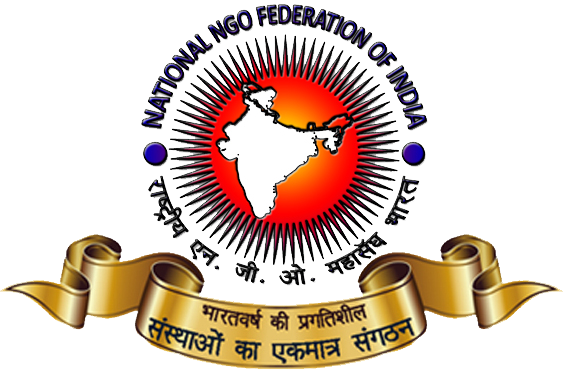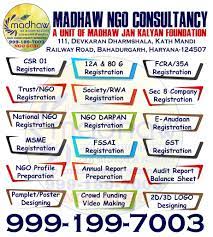NGO Registration
- NGO Registration
- Difference in Company, Society and Trust
- How to Start NGO – Form, Register and Run NGO
- Why to Register NGO
- How to run and manage NGO?
- Society Registration
- Society Registration Process and Procedure
- Name Change Process for Society
- How to Register NGO
- Societies Registration Act, 1860
- Public Charitable trust
- Registration Process of Public Charitable Trust
- After Registering the Public Charitable Trust
- Section 8 Non Profit Company Registration
NGO Resources
- NGO Resources
- NGO & Government of India
- NGO Partnership Registration
- Relations of NGOs with Business and Commerce
- Public Grievances Resolution related to Government
- Social Calendar
- NGO Management
- NGO Support
- What is NGO
- Voluntary Organisations and Volunteerism
- NGOs : Classification, Definitions, Typologies and Networks
- Understanding NGOs
- Can any Government Employee or Officer be the member of NGO?
- Income Exemption u/s 35AC Revoked
- Aims, Objectives & Programmes for NGO
NGO Funding & Grants
- NGO Funding
- Fundraising
- Funding and Grant Schemes
- Govt Schemes
- How to raise Funds for NGO
- Project Proposal Process
- Fundraising Ideas and Concepts
- Funding Agencies
- CSR Funding Empanelment by National CSR Hub
- CSR Funds through Corporate
- CSR Policy, Rules, Regulations and Guidelines of Government
- Government Funding Ministries
- International Funding Agencies
- Google for Nonprofits
- Fellowship
- CSR Funding
- Fund Raising
- Government Funding
- Grant Proposal for NGO Writing Preparation Process
- Project Proposals
Indian Non-Profits
- Andaman Nicobar
- Arunachal Pradesh
- Andhra Pradesh
- Assam
- Bihar
- Chandigarh
- Chhattisgarh
- Dadra Nagar Haveli
- Daman and Diu
- Delhi
- Goa
- Gujarat
- Haryana
- Himachal Pradesh
- Jammu Kashmir
- Jharkhand
- Ladakh
- Karnataka
- Kerala
- Lakshadweep
- Madhya Pradesh
- Maharashtra
- Manipur
- Meghalaya
- Mizoram
- Mumbai
- Nagaland
- Orissa
- Pondicherry
- Punjab
- Rajasthan
- Sikkim
- Tamil Nadu
- Telangana
- Tripura
- Uttar Pradesh
- Uttarakhand
- West Bengal
The Term Non-Governmental Organisation – NGO

The term, “Non-Governmental Organisation” or NGO, came into currency in 1945 because of the need for the UN to differentiate in its Charter between participation rights for intergovernmental specialized agencies and those for international private organizations. At the UN, virtually all types of private bodies can be recognized as NGOs. They only have to be independent from government control, not seeking to challenge governments either as a political party or by a narrow focus on human rights, non-profit-making and non-criminal.
The structures of NGOs vary considerably. They can be global hierarchies, with either a relatively strong central authority or a more loose federal arrangement. Alternatively, they may be based in a single country and operate transnationally. With the improvement in communications, more locally-based groups, referred to as grass-roots organizations or community based organizations, have become active at the national or even the global level. Increasingly this occurs through the formation of coalitions. There are international umbrella NGOs, providing an institutional structure for different NGOs that do not share a common identity. There are also looser issue-based networks an.d ad hoc caucuses, lobbying at UN conferences. In environmental politics, this occurs in the unique form of the nine “Major Groups”, listed in Agenda 21.
At times NGOs are contrasted with social movements. Much as proponents of social movements may wish to see movements as being more progressive and more dynamic than NGOs, this is a false dichotomy. NGOs are components of social movements. Similarly, civil society is the broader concept to cover all social activity by individuals, groups and movements. It remains a matter of contention whether civil society also covers all economic activity. Usually, Society is seen as being composed of three sectors: government, the private sector and civil society, excluding businesses.
NGOs are so diverse and so controversial that it is not possible to support, or be opposed to, all NGOs. They may claim to be the voice of the people and to have greater legitimacy than governments, but this can only be a plausible claim under authoritarian governments. However, their role as participants in democratic debate does not depend upon any claim to representative legitimacy.
Glossary
Agenda 21 : A document adopted by UNCED as a program of action on sustainable development for all sectors of government and society in each country.
Caucus : A term derived from politics in the USA, meaning a group of people who meet together to devise a common political strategy.
CBO : Community-based organization.
Civil society : A complex contested term, usually referring to all people, their activities / and their relationships that are not part of the process of government. It may also be used to cover all processes other than government and economic activity.
Consultative status : The arrangements specified in three resolutions of ECOSOC in 1950, 1968 and 1996, whereby NGOs may be given the right to participate in ECOSOC and all its subsidiary bodies.
CSD : UN Commission on Sustainable Development, reporting to ECOSOC, the most important intergovernmental policy-making body on environmental questions. Its influence is through the impact on the policy of governments. It has no programs of its own.
CSO : Civil society organization.
ECOSOC : Economic and Social Council of the United Nations: one of the ‘principal organs’ specified in the UN Charter and the body to which NGOs are accredited.
INGO : International non-governmental organization.
Major Group : One list of nine categories of NGOs specified in Agenda 21.
National NGO : An NGO based in one country. It is a misnomer as most countries are multi-national, but use of this standard term cannot be avoided.
Network : A coalition of NGOs and/or individual people, at the minimum sharing information and at the maximum devising a common political strategy. Use of the term implies the relationships are loose and informal.
Social Movement : A large number of people who challenge established social norms and express themselves through a variety of forms of mass social and/or political action.
Transnational : Any relationship across country boundaries, in which at least one of the actors is not a government. Most commonly applied to companies, but only when they go beyond trade, to own or control branches, subsidiaries or affiliates in more than one country.
Umbrella group : A coalition of NGOs operating in different fields, in a more formal, structured arrangement than a network.
UNCED : United Nations Conference on Environment and Development, 3-14 June 1992, held in Rio de Janeiro: popularly know as the Earth Summit.



